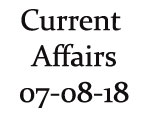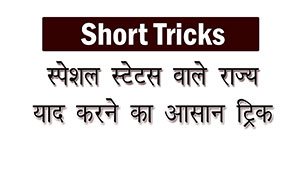-
Current Affairs 7th August 2018
Updated : 07-Aug-2018
Current Affairs 7th August 2018 - Important Points
- New organ donation plan to address Indian-origin shortages announced by -UK government
- Uttarakhand HC banned commercial use of elephants in state on - 3rd August 2018
- Parliament passes bill to give constitutional validity to NCBC on - 6th August 2018
- Parliament passes Criminal Law (Amendment) Bill, 2018 on- 6th August 2018
Current Affairs 7th August 2018 - Details
New organ donation plan to address Indian-origin shortages announced by -UK government
The UK government has recently made announcement related new plans to change the law for organ and tissue donation on August 5th, 2018 to address the urgent need for organs within Indian-origin
communities in the country. In 2020, It is expected to get new system into flow in the UK in 2020, as a part of a drive to assist the black, Asian and minority ethnic (BAME) people awaiting life-saving transplant.Important Highlights
- Under the new system of consent for organ and tissue donation, those who do not want to donate their organs will be able to record their decision on the state-funded NHS (National Health Service) ODR (Organ Donor Register).
- This announcement comes as a recent report called on the National Health Service (NHS) to take proactive action to address the high death rate among the Indian-origin people in Britain due to thier low levels of organ donation within the community.
- The report is named as - 'Organ Donation: Breaking Taboos Amongst British BAME Communities', commissioned by the Winston Churchill Memorial Trust, is aimed at studying the low levels of donation among the BAME communities in the country.
- The report revealed that the people from the BAME community are seen as generally less inclined towards opting for organ donation, largely due to deeply-entrenched cultural and religious beliefs which discourage organ donation.
- However, with respect to India, the report’s findings revealed that India has seen a 10-fold increase in its organ donation consent rates over the last decade as a result of sustained public awareness programs, policy initiatives and multi-stakeholder collaborations.
Uttarakhand HC banned commercial use of elephants in state on - 3rd August 2018
Uttarakhand High Court (HC) banned the commercial use of elephants in the state and directed the state forest department on August 3rd, 2018 to rescue the elephants deployed for commercial purposes within a time span of 24 hours.
The division bench comprising Justices Rajiv Sharma and Lok Pal Singh also directed the forest department to issue notices to the owners of the animals and seek an explanation from them.
Ban on elephant joyrides
- The court termed the captivity of the elephants as being in the violation of Sections 40 and 42 of Wildlife Protection Act, 1975.
- It banned joyrides which were being conducted by the resorts and directed the Chief Wildlife Warden through the Divisional Forest Officers (DFOs) to take over the elephants possession from the owners.
- The elephants will temporarily be kept at Rajaji National Park in Chilla. The injured elephants will be attended by veterinary doctors within 12 hours.
Parliament passes bill to give constitutional validity to NCBC on - 6th August 2018
The Rajya Sabha passed the Constitution (123rd Amendment) Bill seeking to provide constitutional status to the National Commission for Backward Classes (NCBC) on August 6th, 2018 . The bill was passed in the upper house of the Parliament with an absolute majority and over two-third majority of the members present and voting. All 156 members present in the house voted in favour of the bill.
The Lok Sabha had passed the crucial bill on August 2nd with more than two-third majority, with all 406 members present voting in favour after an almost five-hour long debate. The House had passed the bill superseding the changes by the Rajya Sabha.
During the debate on the bill, several members demanded a census to ascertain the population of OBCs while some others pressed for making public the socio-economic survey of 2014. Now, the bill will be sent to the President for his assent.
Important Highlights
- The bill will be provideing granting of constitutional status to the National Commission for Backward Classes (NCBC) on par with the National Commission for Scheduled Castes and the National Commission for Scheduled Tribes.
- It states that the President may specify the socially and educationally backward classes in the various states and union territories in consultation with the Governor of the concerned particular state.
- Under the bill’s provisions, all benefits given to the SCs and STs like scholarship are also expected to extend to the backward classes.
- The bill will be providing the NCBC with the powers of a civil court while probing any complaint.
- The duties of the NCBC will be including investigating and monitoring how safeguards provided to the backward classes under the Constitution and other laws are being implemented and probe specific complaints regarding violation of rights.
Parliament passes Criminal Law (Amendment) Bill, 2018 on- 6th August 2018
Indian Parliament passed the Criminal Law (Amendment) Bill, 2018 that proposes to enhance punishment for rape of a child on August 6th, 2018. The Bill was passed by the Lok Sabha on July 30th, 2018 earlier.
The Bill is aiming to replace the Criminal Law (Amendment) Ordinance, 2018 promulgated on April 21st, 2018 following an outcry over the rape and murder of a woman in at Unnao in Uttar Pradesh and a minor girl in Kathua in Jammu and Kashmir .
The Bill stipulates stringent punishment for those who are guilty of rape, particularly of girls below the age of 12 and 16 years. The ordinance has also ordered death sentence to those guilty of raping girls below the age of 12 years.
Bill Provisions- The Bill is amending the IPC, 1860 to increase the minimum punishment for rape of women from 7 years to 10 years.
- Rape and gang rape of girls below the age of 12 years will strictly be carrying minimum imprisonment of twenty years which is extendable to life imprisonment or death.
- Rape of girls aging between 12 and 16 is punishable with imprisonment of 20 years or life imprisonment.
- If a girl aged between 12 and 16 is gangraped, the convict faces minimum punishment of life sentence.
- Repeat offenders will get punished with life imprisonment or death.
- The Bill will be providing for time-bound investigation in cases of rape of girl children. The investigation into rape of a child must be completed within the span of two months.
- Any appeal against a sentence by the trial court needs to be disposed off within 6 months.














